Preface
In 2023, relations between South Korea and Japan began to thaw. Since the Ministry of Foreign Affairs of Korea announced the solution to address disputes regarding forced labor under Japanese colonial rule in March, six bilateral summits were held in the following six months. Intergovernmental exchange has also rapidly increased. With mediation from the United States, South Korea and Japan established consultative groups to address various issues, creating channels of communication between their foreign affairs, defense, industry, finance, and national security offices. People-to-people exchanges, primarily driven by tourism, have also returned to pre-COVID-19 pandemic levels. Since 2012, they have been stuck over the issue of Comfort Women, and after the 2018 Supreme Court ruling, they were in a standoff over the issue of forced labor, a period that can be considered a “crisis of trust” between the two governments. Is 2023 really a year for both countries to put the “lost decade” behind them and usher in a new era? How do the citizens of both countries assess the changes in relations between their two governments? What do they think is the driving force behind the improvement in relations? Has mutual perception improved as relations have improved? Do they perceive that the historical issues, the culprits of the “lost decade,” are being resolved?
The results of this year’s survey, marking the 11th year since initiated in 2013, are very interesting and carry significant potential interpretations and policy implications. Firstly, citizens of both countries perceived an improvement in their bilateral relations. Positive evaluations have reached their highest levels, while negative evaluations have hit their lowest points since the survey began.
Secondly, there is a noticeable difference in the way citizens of both countries view the progress in bilateral relations. In the case of Japan, favorable opinions have increased with rising favorability toward South Korea, the importance of Korea-Japan relations, support for trilateral security cooperation with the United States and South Korea, and support for a solution to the issue of forced labor. On the other hand, South Korean public opinion has not seen a corresponding increase in positive sentiment regarding these issues, despite increased awareness of an improved relations.
Thirdly, these result disparities are reflected in how citizens of both countries assess their governments’ efforts to improve relations. Japanese public opinion supports the efforts of both their own government and the South Korean government to improve relations, while South Korean public opinion has not shown strong support for them.
Fourthly, historical issues continue to be a major variable affecting bilateral relations. Citizens of both countries consider historical issues as the primary factor in the development of bilateral relations. South Korea focuses on Japan’s historical perceptions, including issues related to wars, history textbooks, forced labor, and Comfort Women. Japan, on the other hand, is concerned with South Korea’s stance, including anti-Japanese education, statements by South Korean politicians and media about Japan, and excessive anti-Japanese actions by South Koreans. From this survey, it can be interpreted that South Korea believes Japan’s historical perceptions have not changed, while Japan believes that South Korea’s anti-Japanese stance is being corrected. However, the fact remains that there are still significant differences in historical perceptions between the two countries.
The implications of the survey results are clear. Both countries need to expand and strengthen functional cooperation in areas such as security and the economy while also making progress towards reconciliation in historical perceptions. Only when these two wheels of functional cooperation and historical reconciliation move together can the South Korea-Japan relationship truly move onto the right track.
1. Improvement in Korea-Japan Relations Felt by the People of Both Countries
According to the survey results, people of both South Korea and Japan are feeling an improvement in South Korea-Japan relations (Figure 1). Negative evaluations of the relationship have sharply decreased from 64.6% in 2022 to 42% in 2023. This represents a significant decline compared to the peak of 88.4% in 2020 during the deteriorating bilateral relations in the summer of 2019 when there were economic retaliations. On the other hand, positive evaluations have increased from 4.9% in 2022 to 12.7% this year. In Japan, the improvement in sentiment is even more pronounced. Negative evaluations of the bilateral relationship have decreased from 39.8% in 2022 to 21.2% in 2023, while positive evaluations have increased from 13.7% to 29% over the same period.
Figure 1. Current ROK-Japan Relations
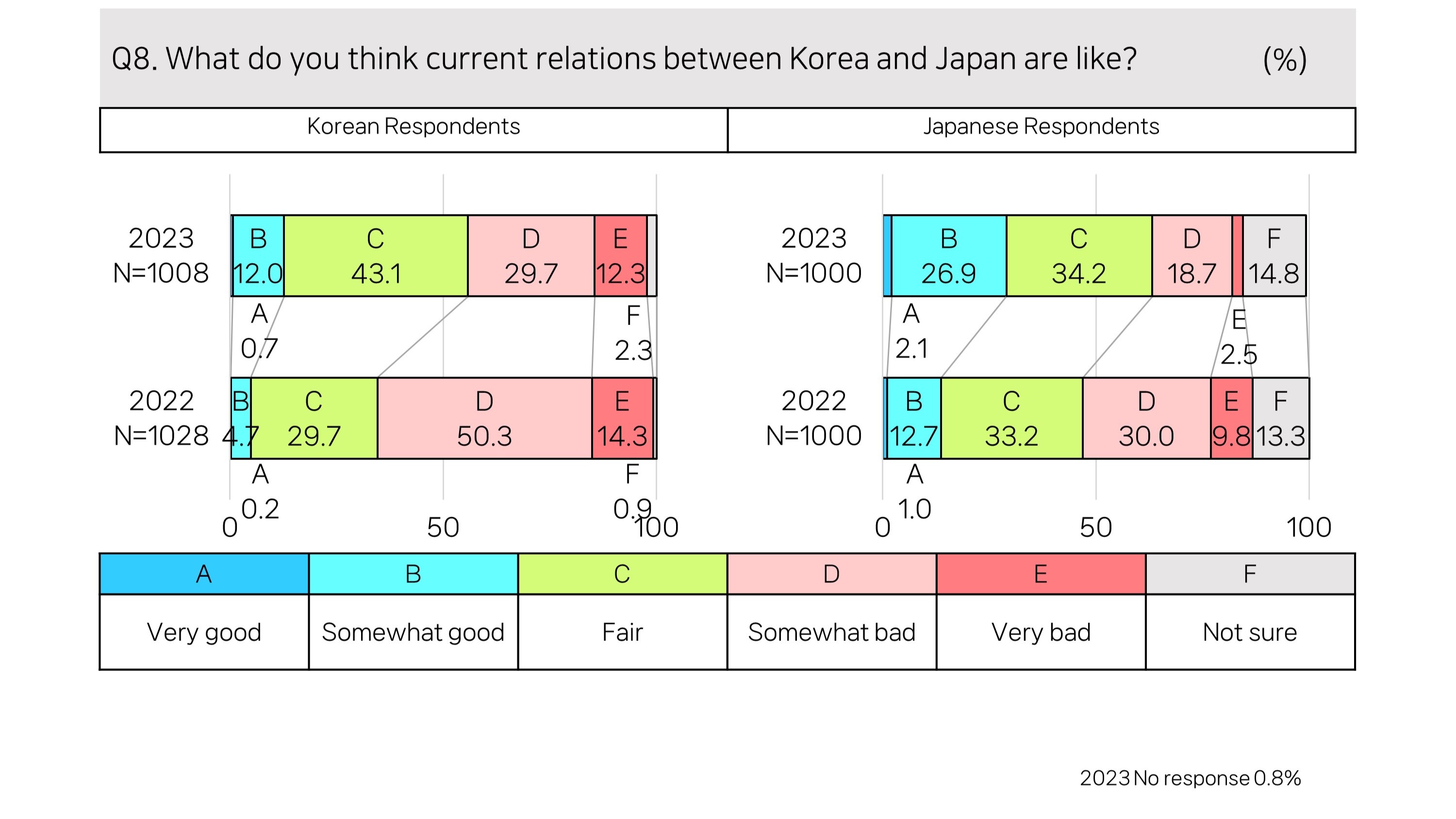
Regarding the future of South Korea-Japan relations, 28.8% of South Koreans believe they will improve, while 48% believe they will stay the same. In Japan, 38.5% expect an improvement, and 31.3% expect they will stay the same (Figure 2). This indicates a continuing trend of improvement and a belief that relations will not worsen compared to the present.
Figure 2. Future of the ROK-Japan Relations
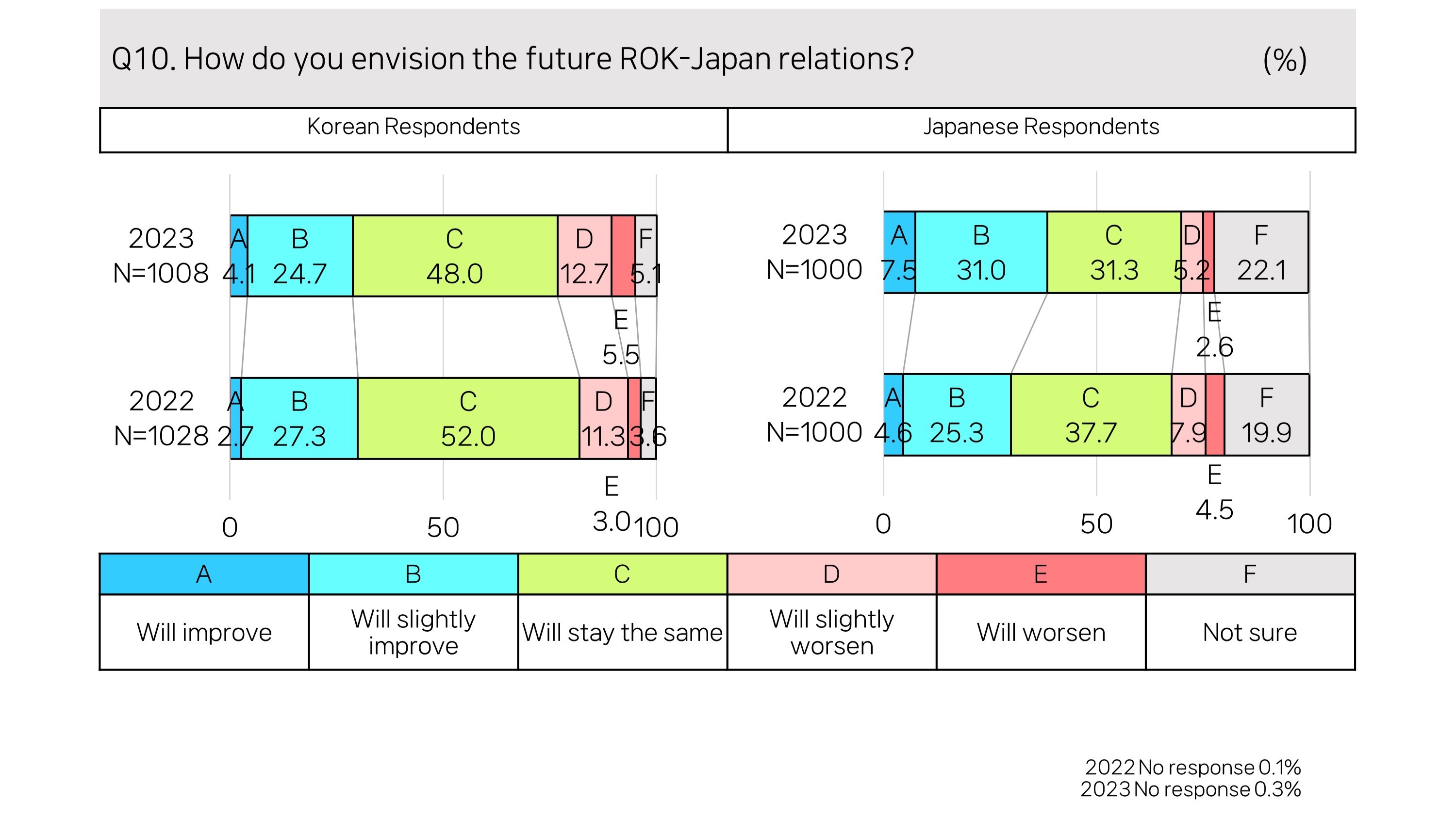
2. Differences in Japanese and Korean Perceptions Revealed in Responses Concerning Impressions of the Counterpart
Has the positive evaluation of bilateral relations lead to an increase in favorable impression of the other country? In the case of South Koreans, their impression of Japan has not changed significantly from the previous year. The percentage with favorable impression has decreased slightly from 30.6% in 2022 to 28.9% in 2023, while those with unfavorable impression increased slightly from 52.8% to 53.3%. In contrast, the Japanese have shown more positive impressions, with the percentage having favorable impression increasing from 30.4% to 37.4% over the same period, and those with unfavorable impression decreasing from 40.3% to 32.8% (Figure 3). In South Korea, the improvement in relations has not lead to improved favorability, while in Japan, the two are aligning.
Figure 3. Impression of the Other Country
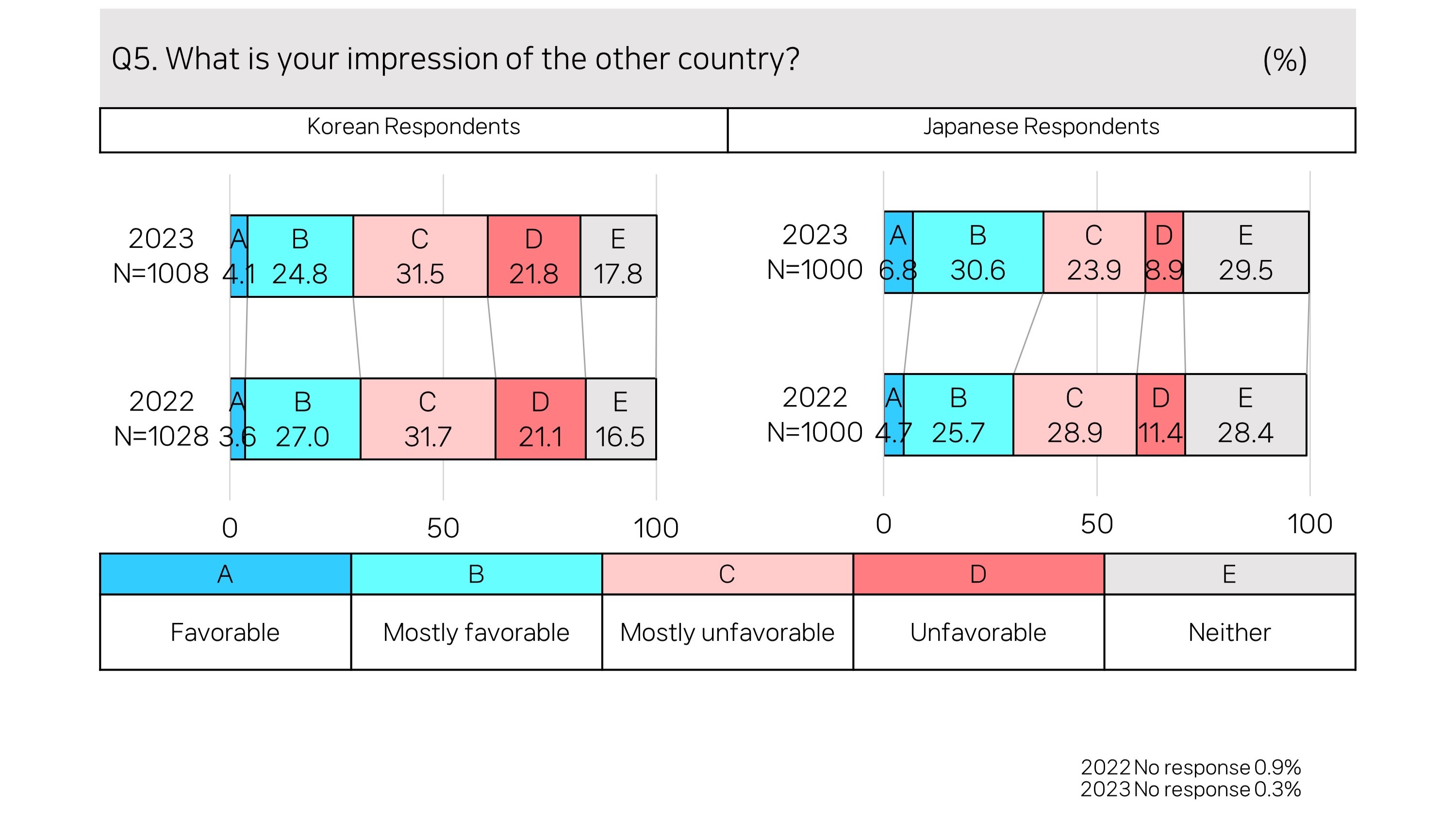
These perceptual differences also extend to the assessment of the other country’s head of state in both countries. When examining the change in perception of Japanese Prime Minister Fumio Kishida among South Koreans, the percentage with a positive impression rose slightly from 6.6% in 2022 to 8.5% in 2023, while the negative impression rose significantly from 21.8% in 2022 to 36.1% in 2023, a 14.3-point increase. Contrarily, the change in perception of South Korean President Yoon Suk Yeol among Japanese citizens saw a 12-point increase in those with a positive impression, from 20.1% in 2022 to 32.1% in 2023, and a slight decrease in those with a negative impression from 4.6% in 2022 to 4.1% in 2023 (Figure 4). This can be interpreted as a result of the efforts of South Korean and Japanese leaders to improve bilateral relations, as citizens in both countries now have clearer impressions. Notably, the difference is that South Korea’s negative impression of Japan increased, while Japan’s positive impression of South Korea increased.
Figure 4. Impression of the Other Country’s Leader
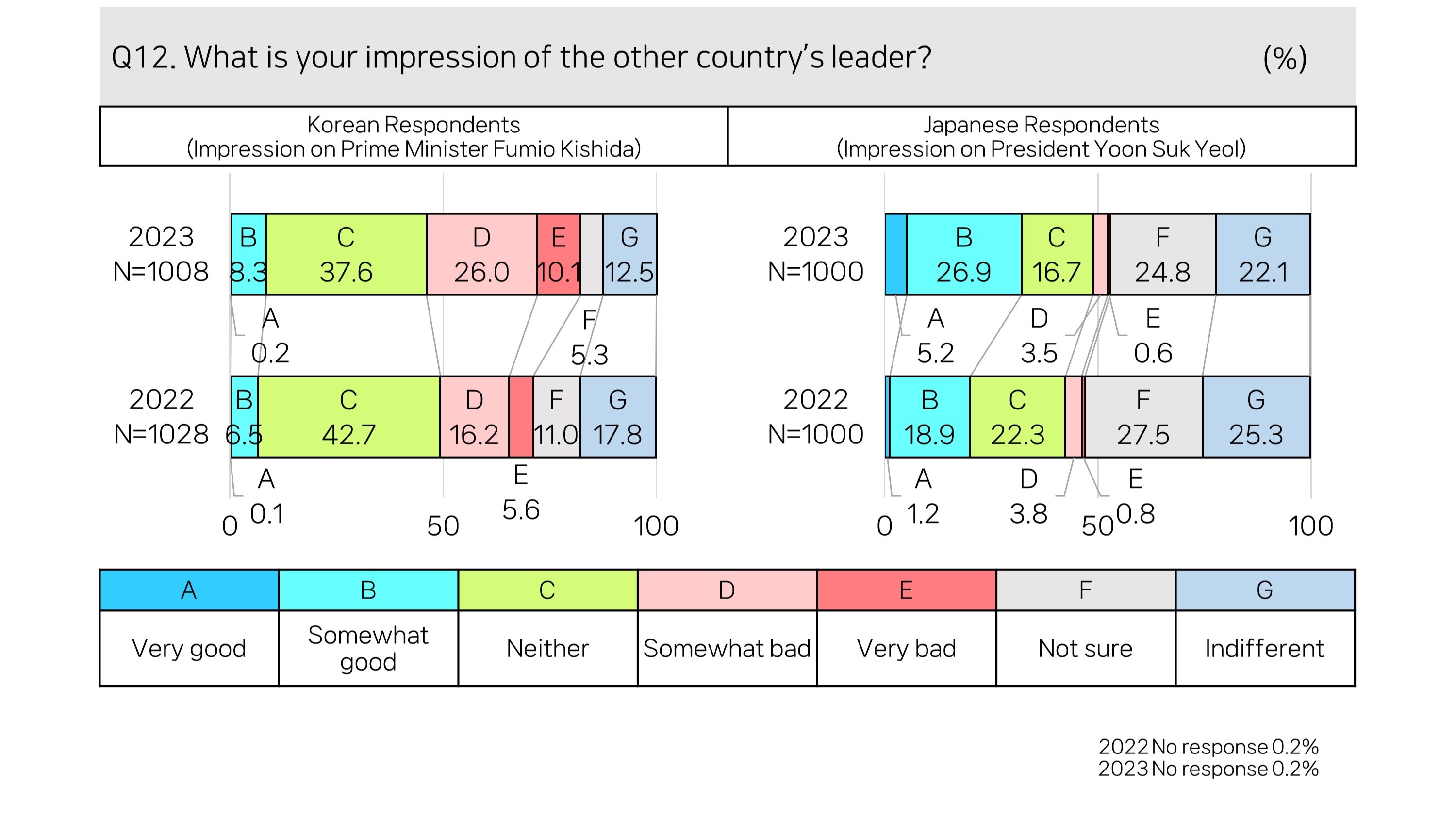
Analyzing the results of the 11-year perception survey between the two countries, it is clear that impressions of the other country are connected to various aspects. The differences in perceptions exist in evaluations on the importance of the relationship, the direction to address South Korea-Japan conflicts, and support for ROK-U.S.-Japan trilateral military security cooperation, which will be discussed in the fifth section. When asked if the current South Korea-Japan relationship is important to their own country, 74.1% of South Korean respondents and 61.8% of Japanese respondents answered “important” or “somewhat important.” Compared to 2022, the percentage of those considering the bilateral relations important has decreased by 8.5% in South Korea and increased by 5.3% in Japan (Figure 5).
Figure 5. Importance of the ROK-Japan Relations
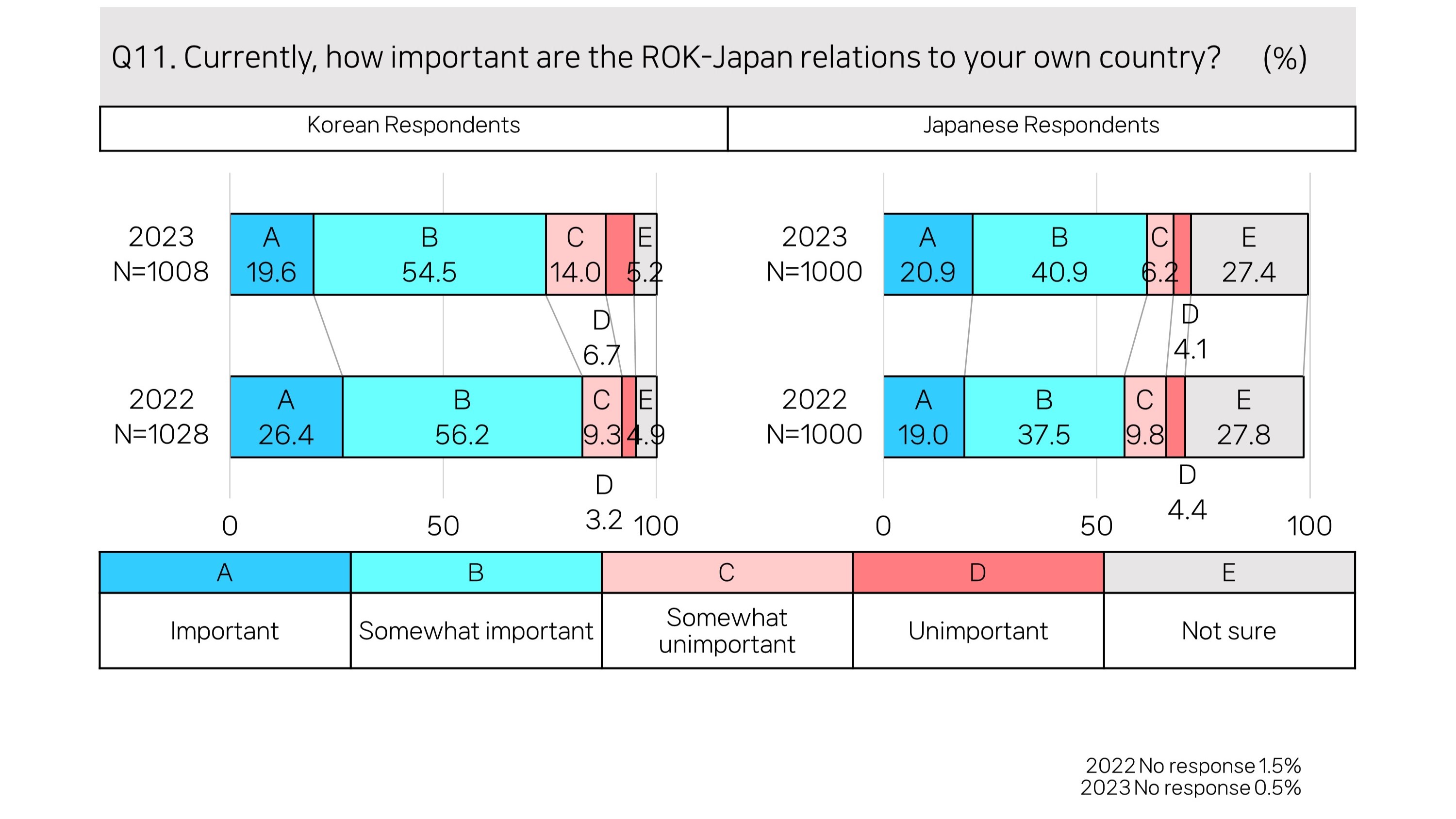
Regarding the direction to address future conflicts between South Korea and Japan, the most common response in both countries was that both sides “should make efforts to manage conflicts to prevent the problem from escalating,” with 48.3% of South Korean respondents and 42.8% of Japanese respondents choosing this option. The response that South Korea and Japan should somehow overcome their existing conflicts in a future-oriented way was selected by 31.3% in South Korea (a decrease of 17.9% point compared to the previous year) and 26.1% in Japan (a decrease of 2.4% point) (Figure 6). In particular, the South Korean side showed a critical attitude towards a future-oriented overcoming of tensions.
Figure 6. Ways to Respond to the Potential Conflict
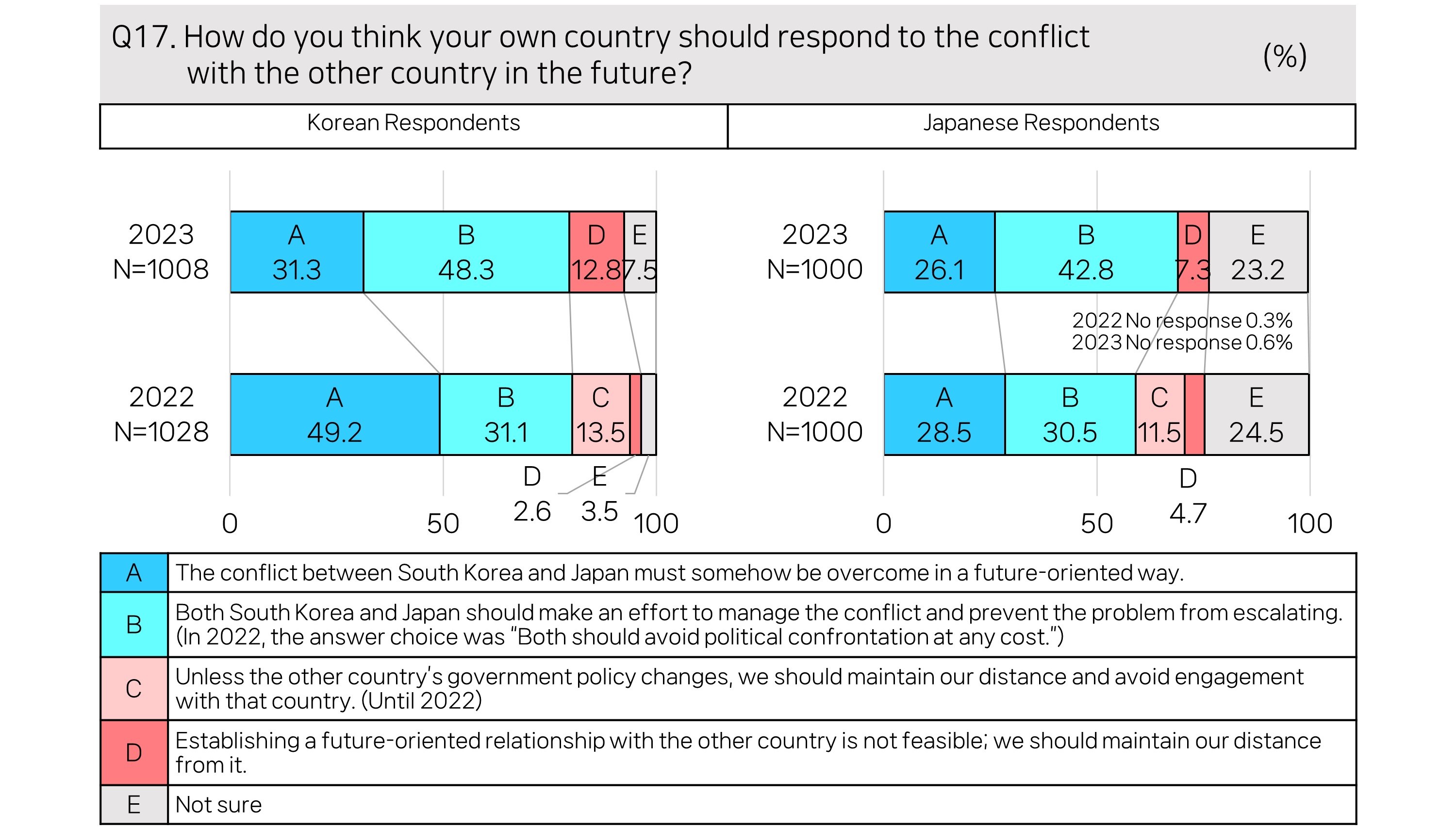
3. Government Policy and Attitude Towards Improving Bilateral Relations are the Main Determinant of Impressions about the Counterpart Country
Figure 7 shows that, in the case of South Koreans, the percentage of those who positively evaluate the South Korean government’s efforts to improve South Korea-Japan relations remains approximately the same at 21.7%, in comparison to 21.2% in the previous year. Meanwhile, the percentage of those with a negative evaluation increased slightly from 27.5% to 32.3%. The positive evaluation figure has dropped by approximately 10% compared to the previous government (30.8% in 2020, 30.2% in 2021). South Korean public opinion is not actively supporting the South Korean government’s efforts to improve relations with Japan.
The key issue in relation to improvement is the resolution of the forced labor issue, where public support for the South Korean government’s pursuit of a third-party subrogation method is not high (28.4% vs. 34.1%). Similarly, South Korean public opinion is highly critical of the Japanese government’s attitude towards improving South Korea-Japan relations (Figure 8). Positive evaluations are at 15%, while negative evaluations are at 34.2%, which is significantly lower compared to Japanese assessments of their own government’s efforts to improve relations, where positive evaluations are at 34.5% and negative evaluations are at 16.2%. In a nutshell, South Korean public opinion expresses dissatisfaction with the attitudes of both governments regarding bilateral relations.
In contrast, Japanese citizens evaluate the South Korean government’s efforts to improve bilateral relations more positively (34.8%), and negative evaluations are lower (19.3%) than those in South Korea. Japanese public opinion shows a more positive assessment of the handling of the forced labor issue by both governments, while South Korean public opinion is relatively negative in this regard.
Figure 7. Assessment on the South Korean Government’s Policy Towards Japan
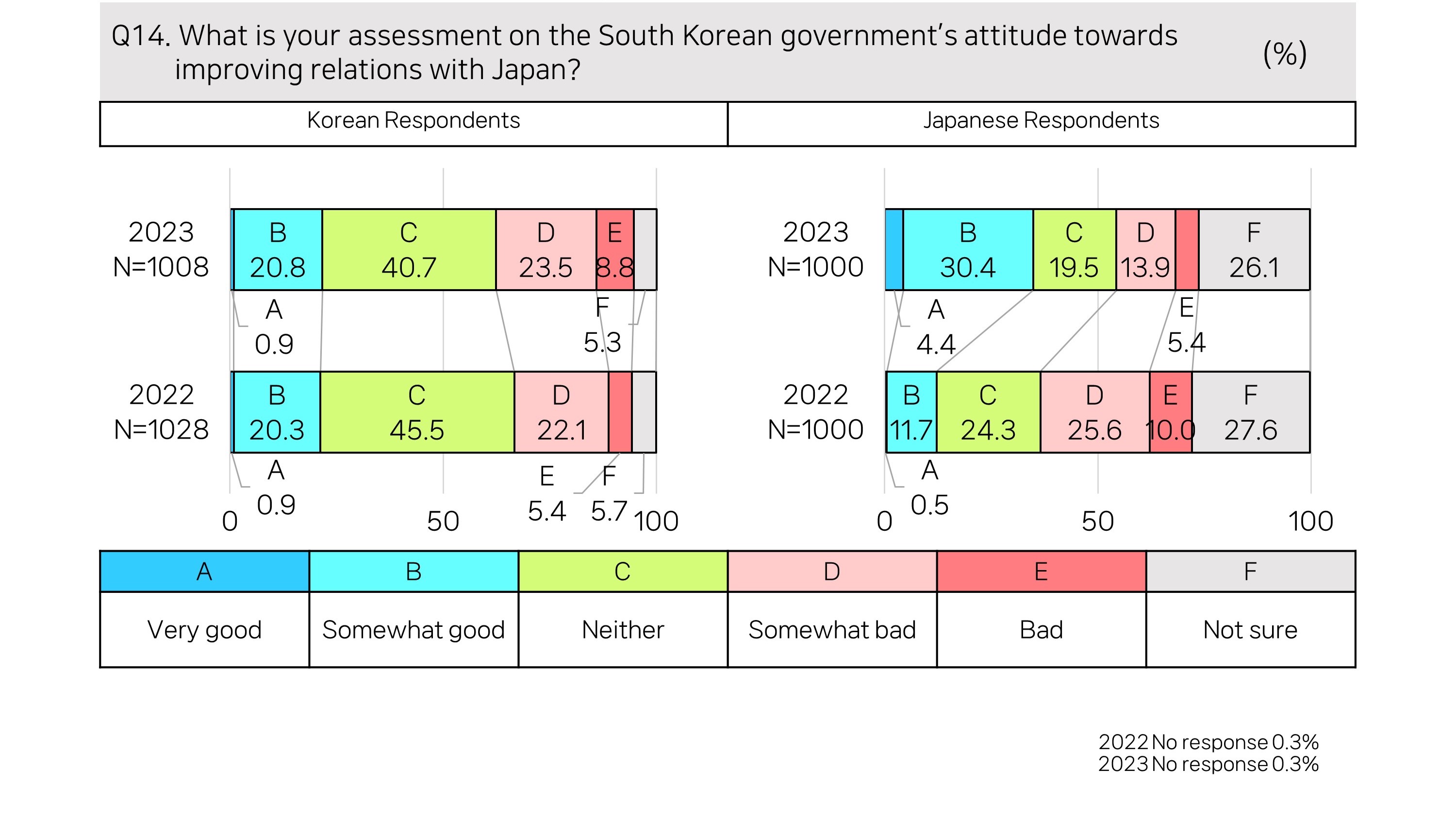
Figure 8. Assessment on the Japanese Government’s Policy Towards South Korea
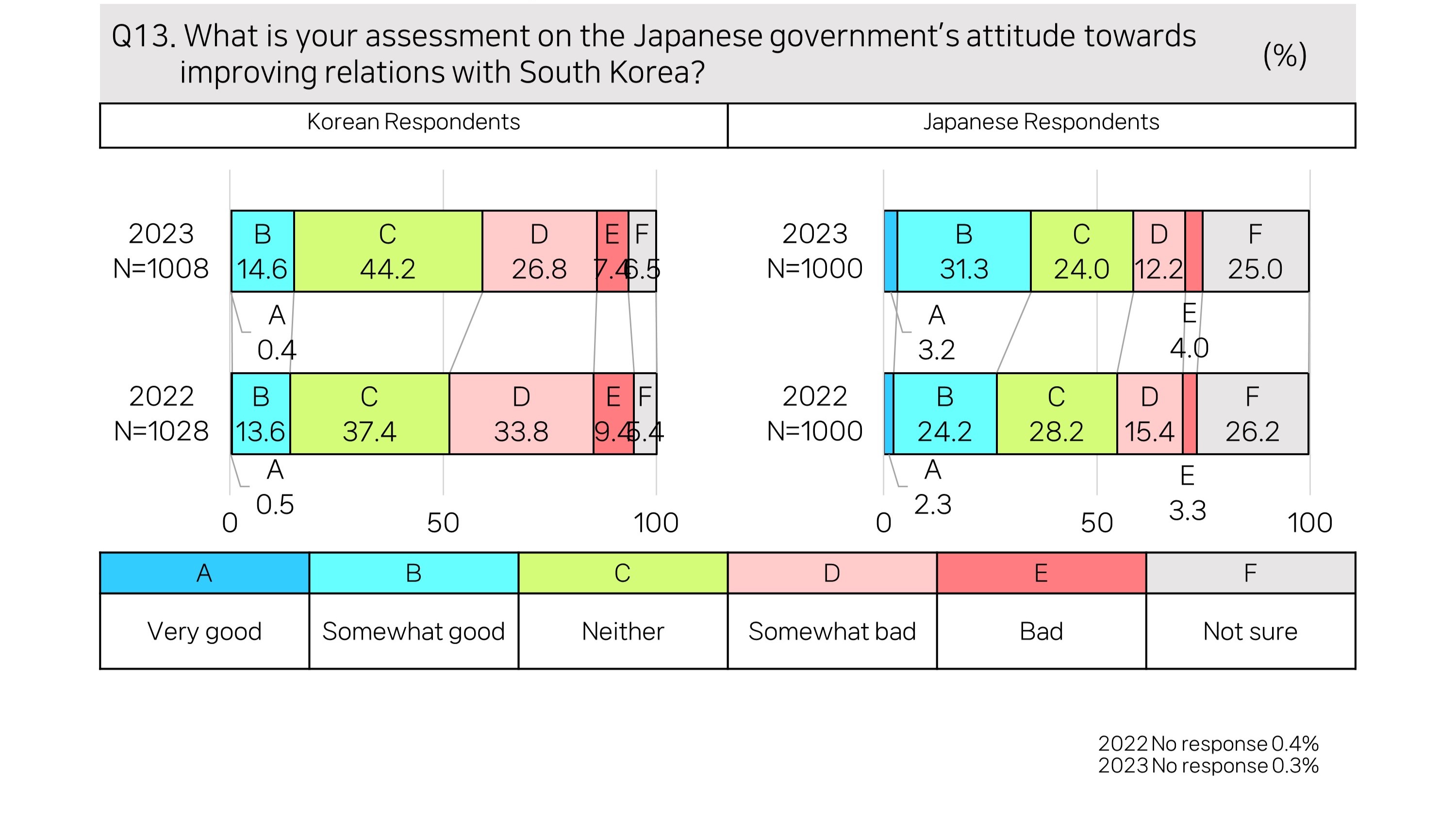
What variables have the most significant impact on the perceptions of Korean and Japanese citizens about each other? To identify this, an ordinal logistic regression analysis was conducted on the mutual favorability variable of both countries’ citizens, to determine the variables that have the most significant impact on their impression changes.
Table 1. Results of Ordinal Logistic Regression on South Koreans’ Favorability Toward Japan
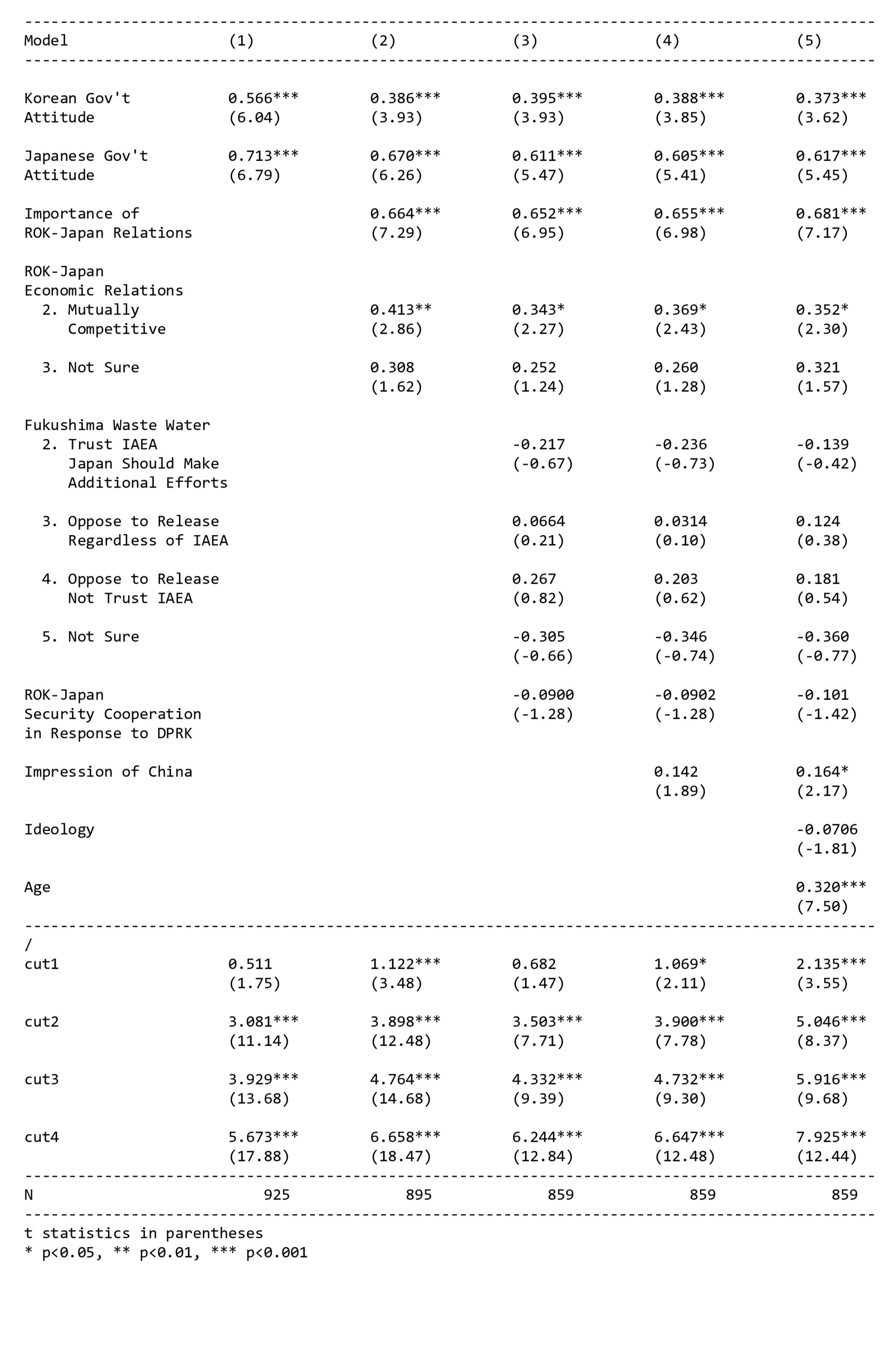
Table 1 presents the results of the ordinal logistic regression analysis for the favorability of South Koreans toward Japan. The results can be summarized as follows:
Firstly, the statistically significant variables that affect South Koreans’ favorability toward Japan are (1) the South Korean government’s efforts to improve relations, (2) the Japanese government’s efforts to improve relations, (3) the perceived importance of South Korea-Japan relations, (4) perceptions of South Korea-Japan economic relations, (5) impressions of China, and (6) age. All these variables show a positive correlation, meaning that the more positively one (1) evaluates the efforts of both South Korean and Japanese governments, (2) perceives the South Korea-Japan relationship as important, (3) views South Korea-Japan economic relations as complementary rather than competitive, (4) has a more positive impression of China, and (5) belongs to a younger age group, the more positively they perceive Japan.
Secondly, given that a greater magnitude of the t-value implies stronger evidence against the null hypotheses, it is possible to point out that the two most important variables affecting South Koreans’ favorability toward Japan are “age” and “perceived importance of South Korea-Japan relations,” followed by “Japanese government’s efforts to improve relations” and “South Korean government’s efforts.”
Thirdly, in the case of the Fukushima waste water release issue (Figure 9), when using the group that “trusts the IAEA’s verification and believes that the Japanese government’s actions are justified” as the reference group, the other groups (“trusts the IAEA’s verification but the Japanese government should make additional efforts to address and alleviate distrust”, “opposes the water release regardless of the IAEA’s verification”, “opposes the water release because the IAEA’s verification is not trustworthy”, “not sure”) do not significantly influence South Koreans’ favorability toward Japan. This suggests that South Koreans’ negative perception of the Fukushima waste water release does not directly translate into a negative perception of Japan. Moreover, the “necessity and support for South Korea-Japan military cooperation in response to the North Korean nuclear threat” and “ideology” variables do not have statistically significant effects in Model 5, the most comprehensive model.
Figure 9. Opinion on the Release of Waste Water
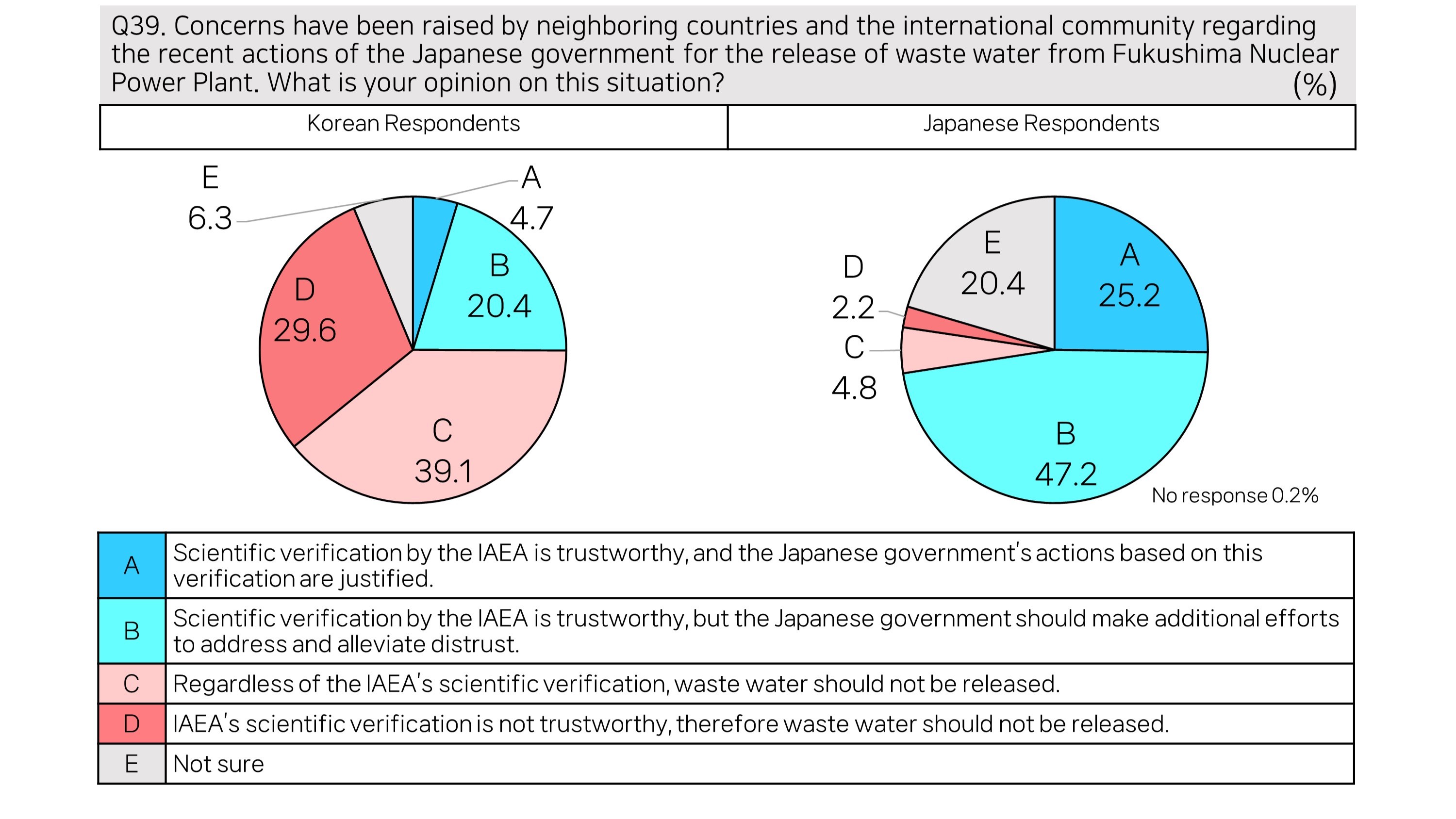
Based on these regression analysis results, it is noteworthy that despite significant progress in improving bilateral relations over the past year, South Koreans’ favorability toward Japan has remained relatively stagnant. This can be attributed to the 8.5%-point decrease in the percentage of South Koreans who perceive the importance of South Korea-Japan relations as well as their dissatisfaction with the efforts of both the South Korean and Japanese governments. This means that even if the South Korean government makes proactive efforts, it may be difficult to improve South Koreans’ favorability toward Japan if the Japanese government does not respond positively and takes a passive stance. Regarding the Fukushima wastewater release issue, although the interpretation is challenging as the analysis is based on how the dependent variable changes when the independent variable shifts from the base group to other groups, it is possible to confirm that the wastewater variable does not have a direct influence on South Korean’s favorability towards Japan. Namely, the negative impressions towards the waste water release does not seem to directly impact negative impressions of Japan.
Table 2 summarizes the results of the analysis of variables that affect the favorability of Japanese citizens toward South Korea, using the same variables applied for South Korea.
Table 2. Results of Ordinal Logistic Regression on Japanese’s Favorability Toward South Korea
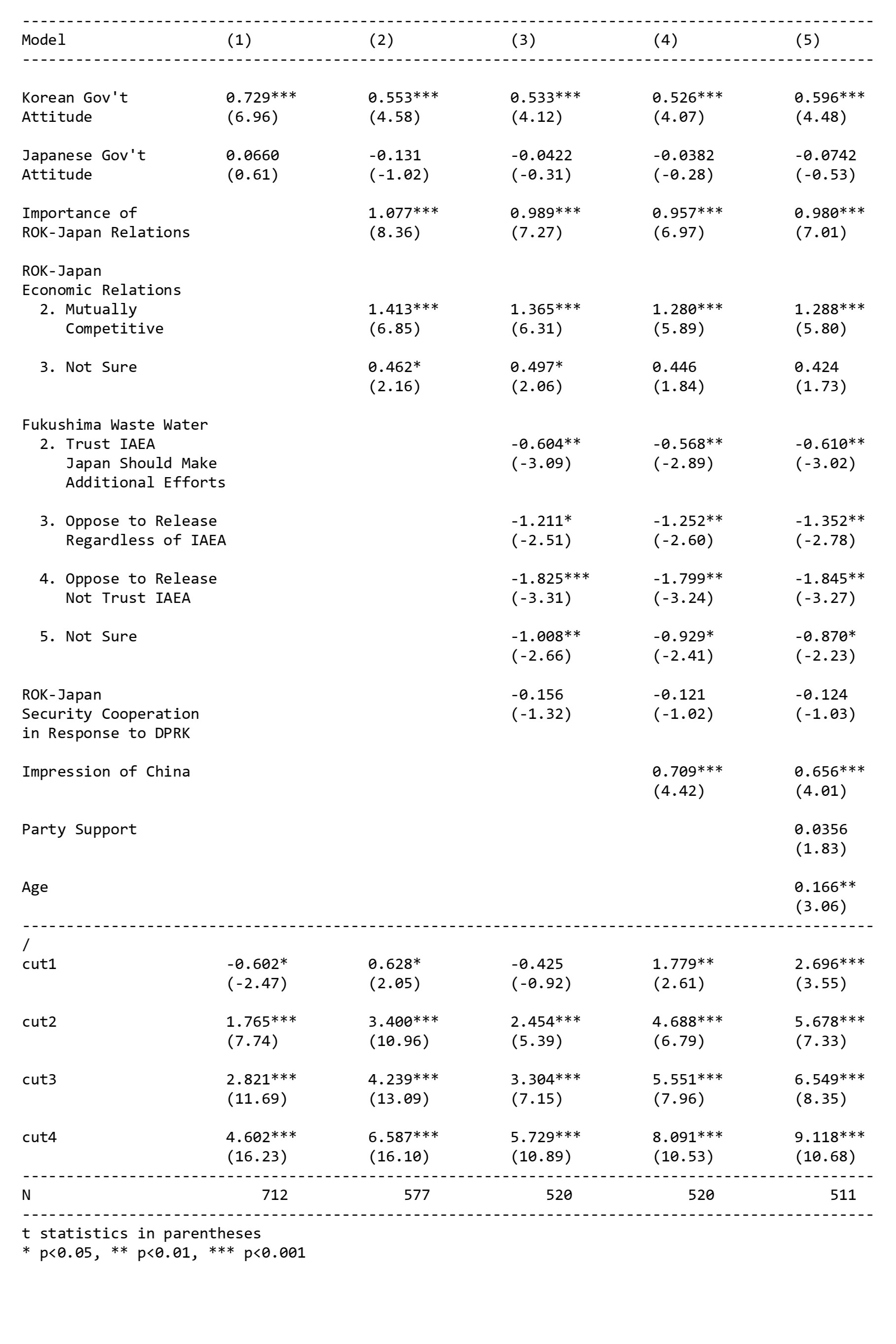
Firstly, the most important variable that significantly affects the favorability of Japanese citizens toward South Korea is the “perceived importance of South Korea-Japan relations,” followed by “perceptions of South Korea-Japan economic relations” and “South Korean government’s efforts to improve relations.”
Secondly, interestingly, the “Japanese government’s efforts to improve relations” do not significantly influence Japanese citizens’ favorability toward South Korea. Likewise, the “necessity for Korea-Japan military cooperation in response to North Korean nuclear threats” or “party identity” variables had no statistically significant influence. It seems clear that the South Korean government’s efforts to improve bilateral relations, especially the proactive efforts of the Yoon Suk Yeol government, played an important role in driving positive perceptions of South Korea among Japanese citizens.
4. Korea-US Relations: Main Driving Force behind Improvement in Korea-Japan Relations
The United States, in its Indo-Pacific Strategy released in February 2022, emphasizes the trilateral security cooperation among the United States, South Korea, and Japan as a core element of its Indo-Pacific strategy and explicitly states the need for the restoration of South Korea-Japan relations. In fact, the U.S. government played a pivotal role in the process leading to the 2015 South Korea-Japan Comfort Women Agreement (Sohn 2018), and even in the midst of diplomatic friction between the Moon Jae-in admіnistration and the Abe admіnistration over the forced labor issue, the United States made various mediation efforts. When the solution to the issue was announced in March, President Biden issued an unprecedented statement welcoming it as “a groundbreaking new chapter of cooperation and partnership between two of the United States’ closest allies.”
In this context, it becomes evident that South Koreans also consider U.S. factors, such as ROK-U.S. relationship and alliance, as key elements in improving South Korea’s relations with Japan. When South Korean respondents were asked if improving South Korea-Japan relations is necessary for the advancement of the ROK-U.S. alliance, 71.6% of them responded “strongly agree” or “agree” (Figure 10). These results indicate the potential to drive further progress in improving ROK-Japan relations, considering South Koreans’ strong perception of the significance of the ROK-U.S. alliance in dealing with external threats such as North Korea.
Figure 10. ROK-Japan Relations in the ROK-U.S. Alliance
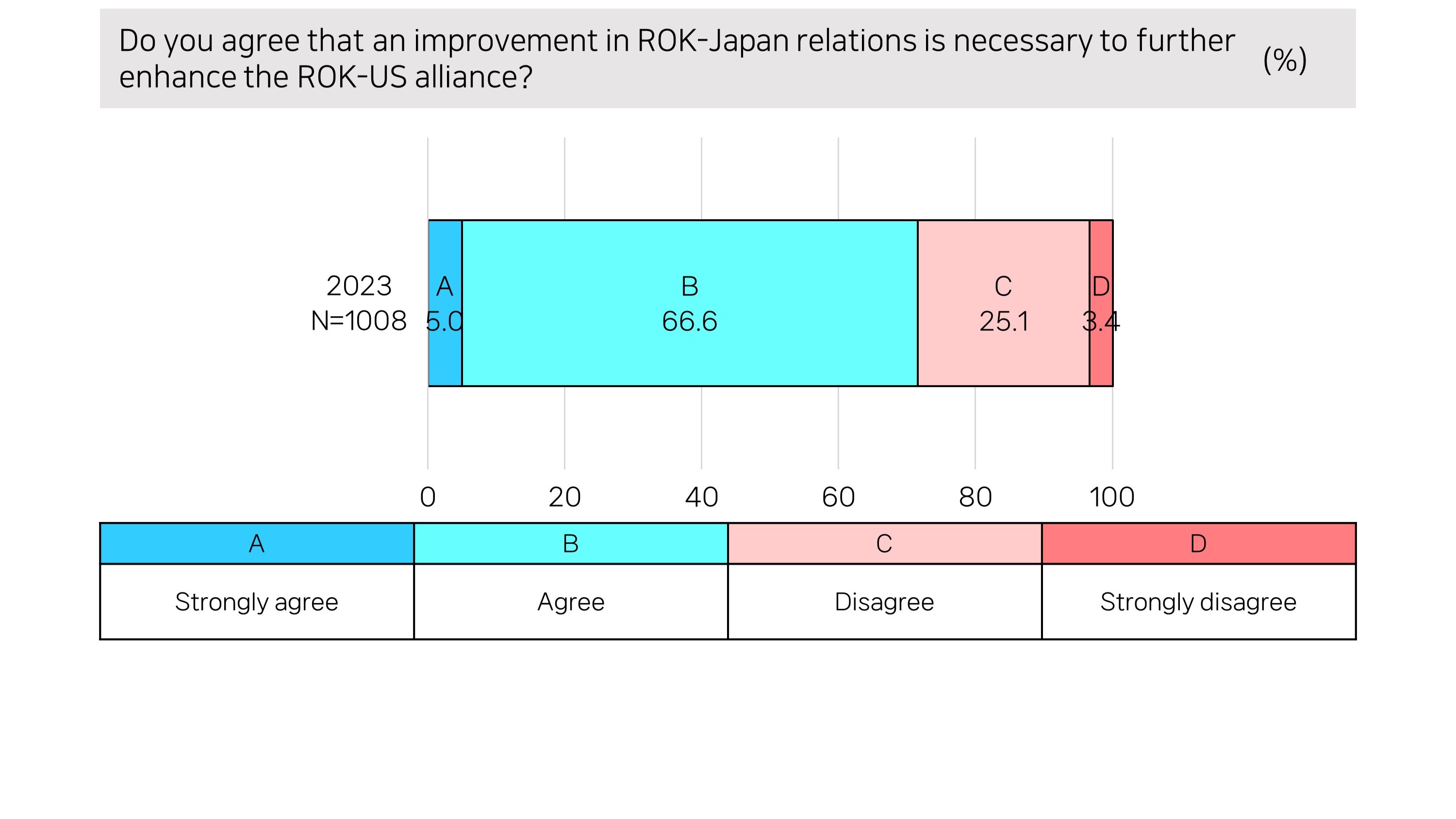
5. Solid Public Support in Both Countries for Korea-Japan Security Cooperation
Both countries’ citizens express strong support for trilateral security cooperation among the United States, South Korea, and Japan. The percentage of respondents in favor of enhancing trilateral military and security cooperation was 60.6% in South Korea and 49.9% in Japan (Figure 11). Although the positive response rate from Japanese citizens is lower than that of South Koreans, it reached its highest level since the survey first asked this question in 2018, increasing by 12 percentage points from 37.9% in 2022. When respondents who agreed with the enhancing of trilateral military and security cooperation were asked about the reasons, the most common response in both countries was that cooperation is essential for denuclearization of North Korea and stability on the Korean Peninsula (Figure 12).
Figure 11. Views on Enhancing the ROK-US-Japan Trilateral Military Security Cooperation
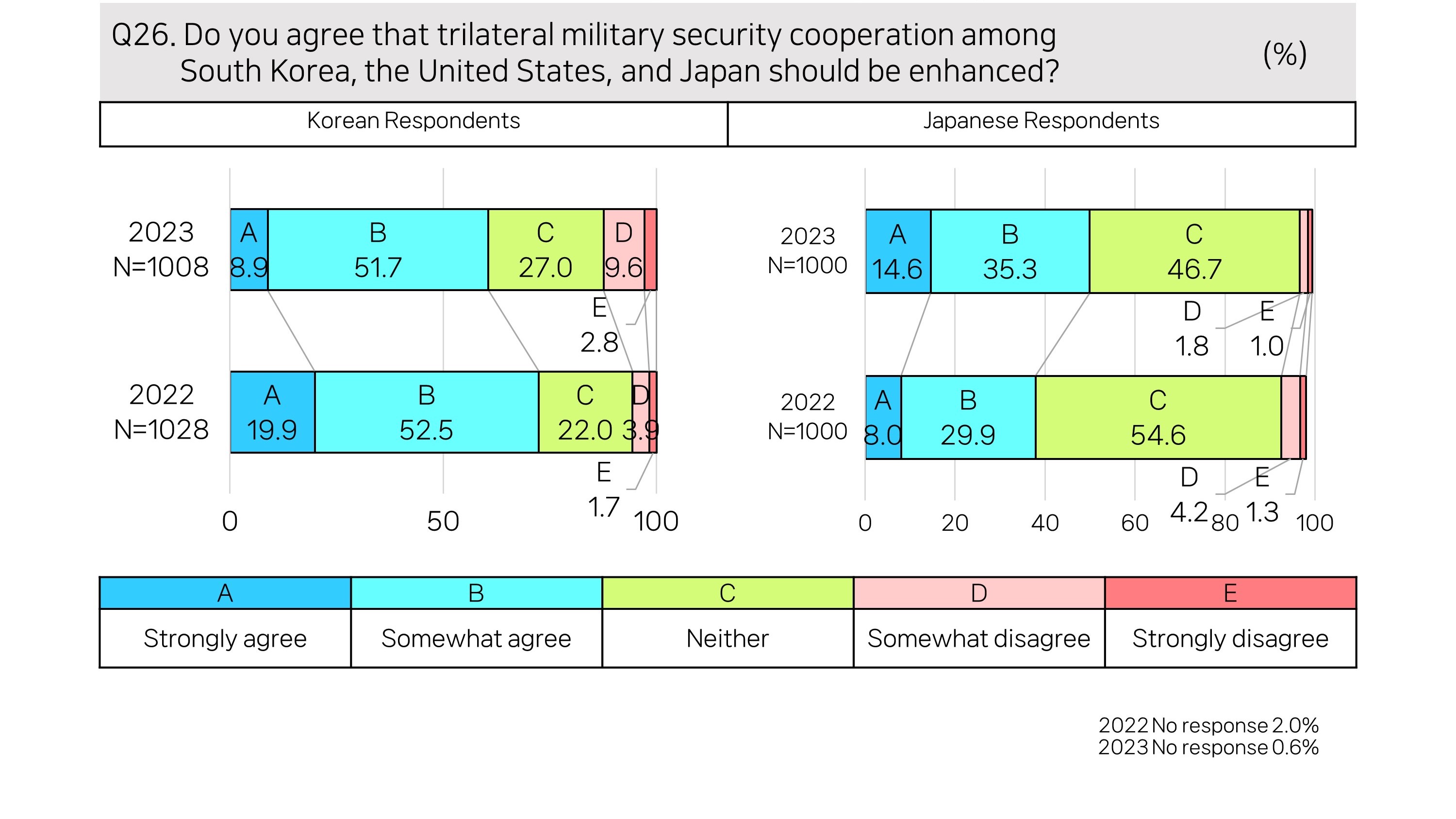
Figure 12. Reasons Why the ROK-US-Japan Trilateral Military Security Cooperation Should Be Strengthened
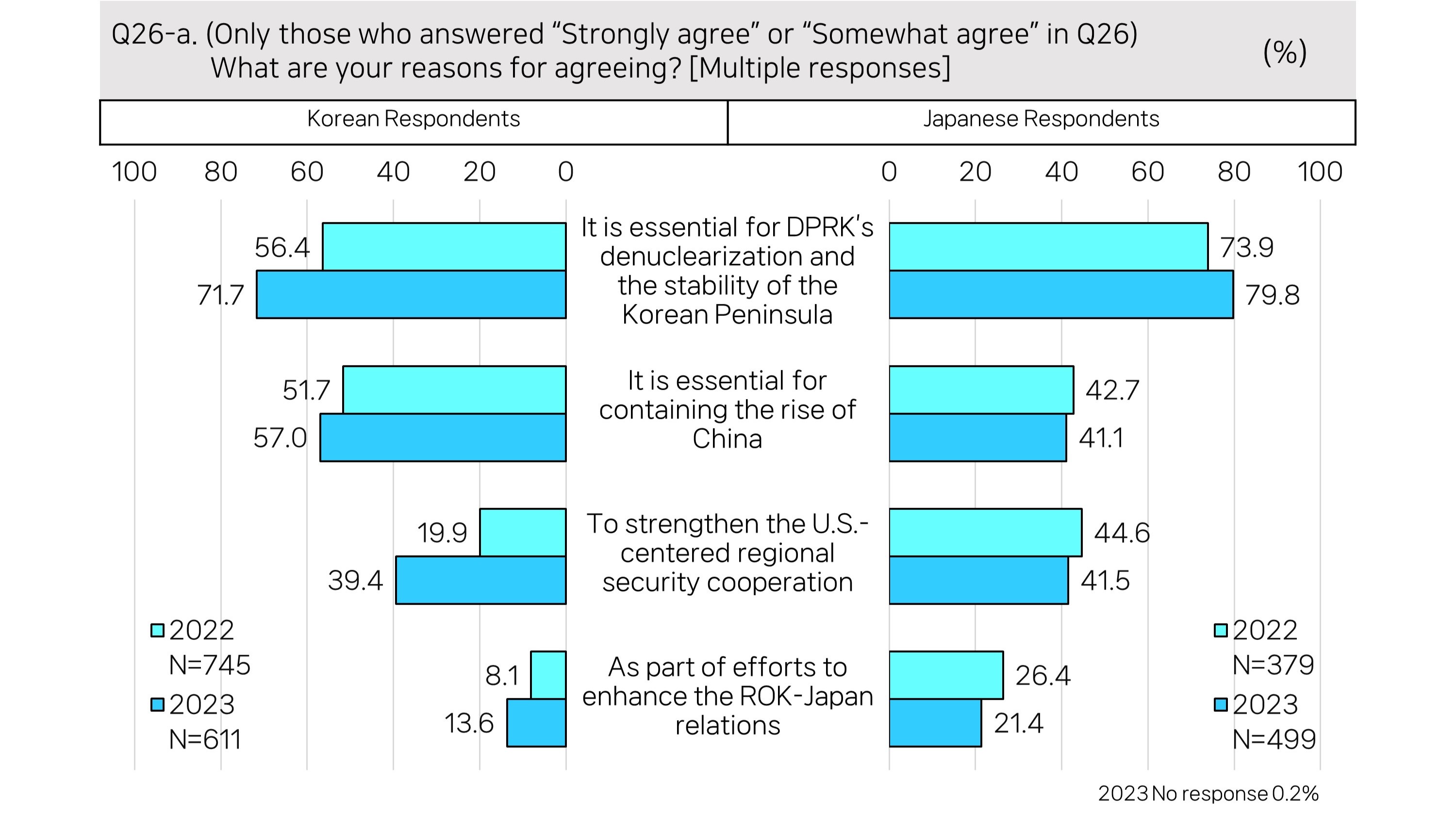
Meanwhile, respondents who were negative about enhancing trilateral cooperation mainly expressed the concern that it would escalate tensions on the Korean Peninsula. Notably, in Japan, the response stating that “the historical actions of South Korea raise doubts about its trustworthiness” was the highest at 70.9% in 2022 but significantly decreased to 39.3% in 2023 (Figure 13). Although this data pertains to respondents with negative views on enhanced cooperation, it suggests a considerable reduction in skepticism among Japanese citizens towards South Korea, which has been a stumbling block to military and security cooperation.
Figure 13. Reasons Why the ROK-US-Japan Trilateral Military Security Cooperation Should Not Be Strengthened
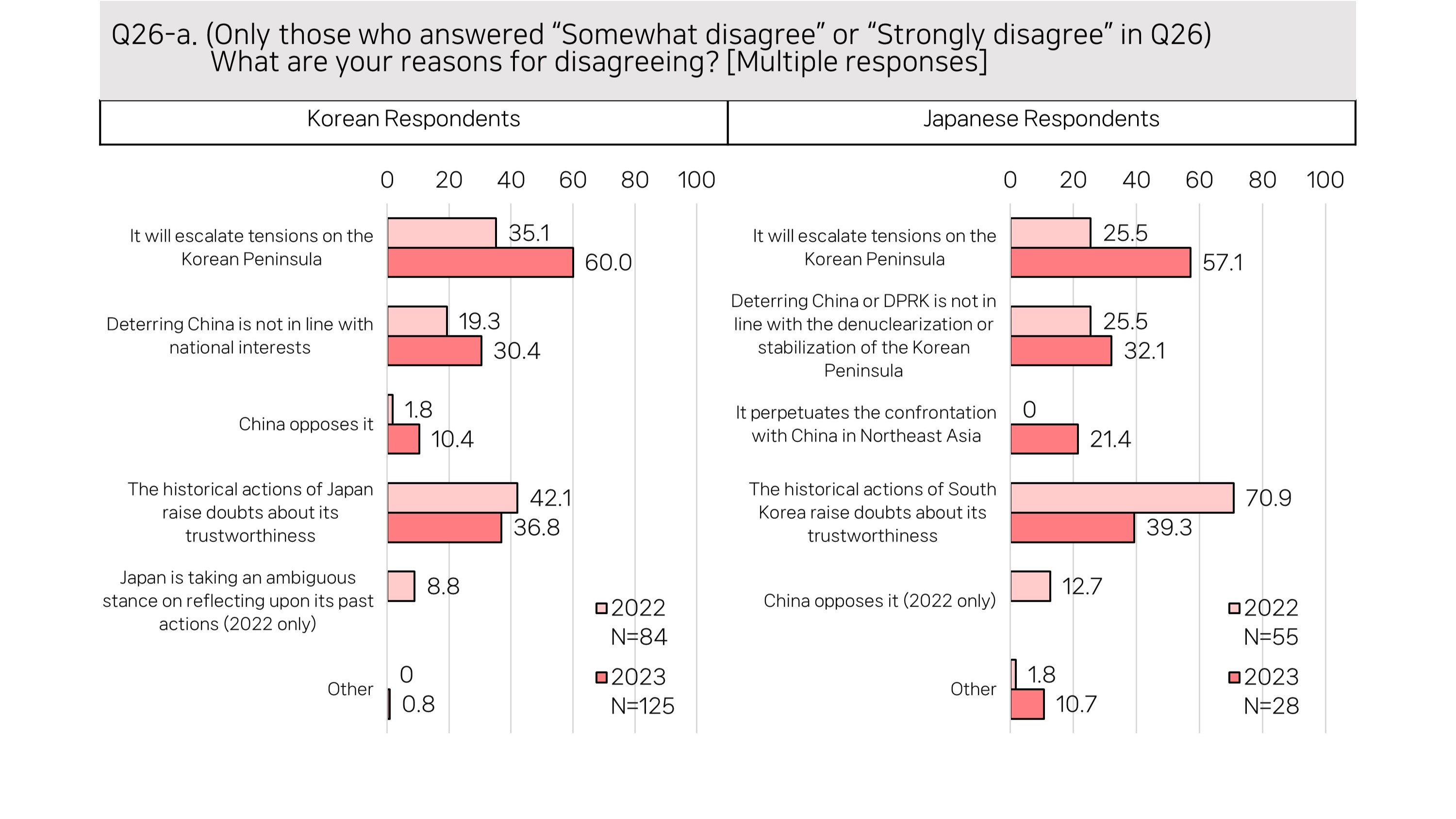
In this year’s survey, respondents were asked about the direction of South Korea-Japan security cooperation in response to the growing threat of North Korea’s nuclear and missile capabilities. 82% of South Korean respondents and 71.4% of Japanese respondents indicated the need for information sharing or higher levels of security cooperation (Figure 14). As such, citizens of both countries not only recognize the need for existing trilateral cooperation based on the ROK-U.S. and U.S.-Japan alliances but also acknowledge the necessity of security cooperation between South Korea and Japan. This public opinion aligns with the efforts of both countries to expand security cooperation, as seen in the declaration of the normalization of the South Korea-Japan General Security of Military Information Agreement (GSOMIA) in the aftermath of the South Korea-Japan summit in March.
Figure 14. Direction of the ROK-Japan Security Cooperation in Response to DPRK
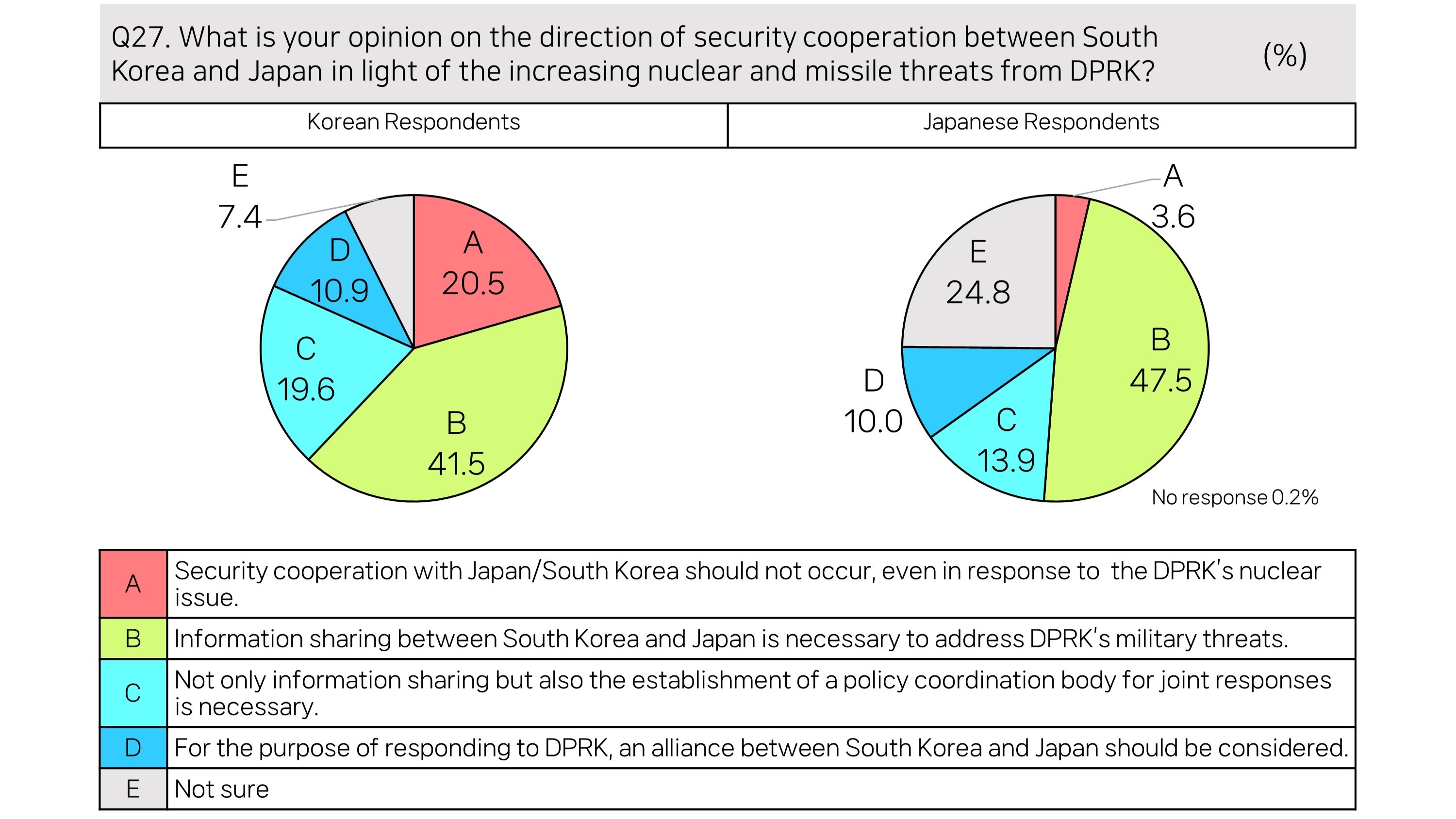
6. Trends in Favor of Korea-Japan Economic Cooperation
This survey also reaffirmed the favorable tendencies regarding the economic relationship between South Korea and Japan. When respondents were asked about their views on South Korea-Japan economic relations, the percentage of those who responded that the relationship is mutually complementary was 44.6% in South Korea and 38.5% in Japan. The percentage of those who responded that the relationship is competitive was 38.1% in South Korea and 24% in Japan (Figure 15). In comparison to the 2022 results, South Korea saw a reversal, with more respondents leaning towards the view of mutual complementarity rather than competition, while in Japan, there was a continued decrease in the view of the relationship being competitive since 2021.
Figure 15. Economic Relations Between South Korea and Japan
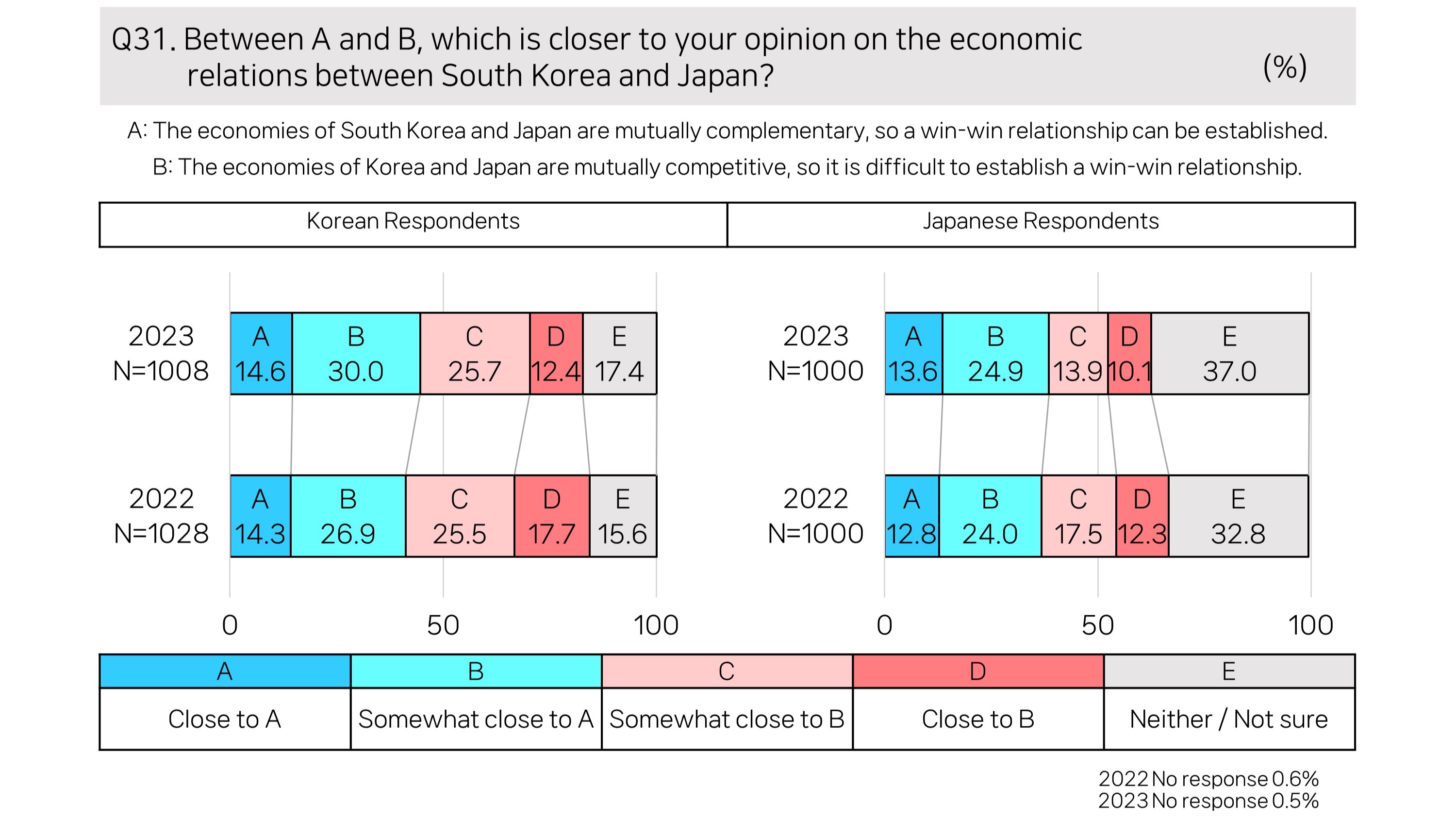
When respondents were asked to select all countries or regions that are particularly important to their own country in terms of economic relations, South Korean citizens ranked Japan as the third most important, following the United States and China. On the other hand, Japanese citizens ranked South Korea as the fourth most important, following the United States, China, and India. The percentage of respondents selecting the counterpart countries as important increased slightly in both countries compared to 2022 (Figure 16).
Figure 16. Economically Important Countries and Regions
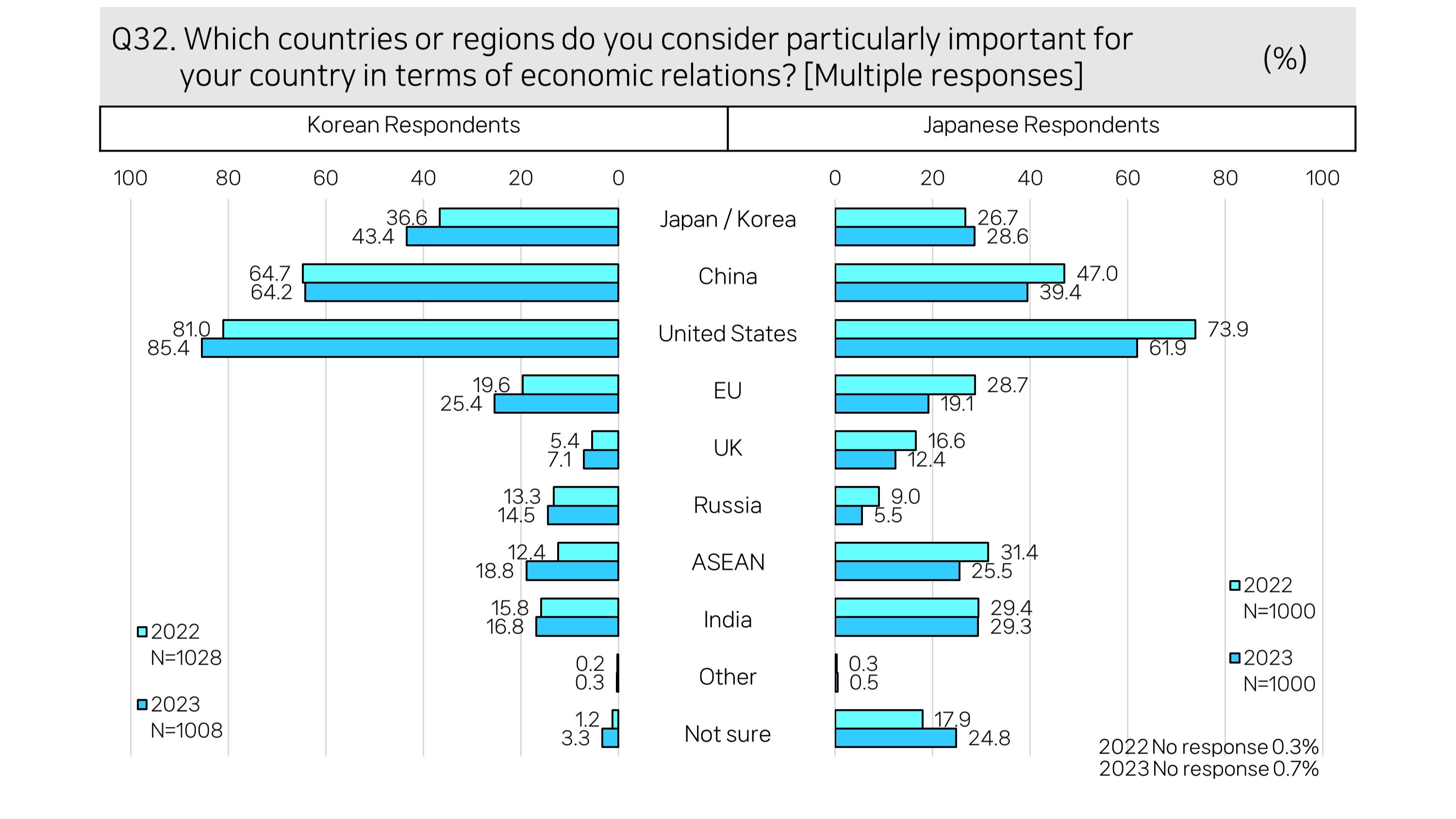
7. Conclusion
The 2023 Korea-Japan Joint Public Opinion Poll indicates that public sentiment in both nations is slowly departing from the “lost decade” characterized by mutual mistrust and emotional conflicts related to historical matters, which has endured since 2012. The restoration of trust between the two countries’ leaders has led to a rapid improvement in government-to-government relations, and the public views this trend positively. This can be attributed to active efforts by the United States to promote the improvement of South Korea-Japan relations and the increasing perception of threats posed by North Korean nuclear and missile provocations and China. In the case of South Korea, the increasing security threats from North Korea and China have led to the strengthening of the ROK-U.S. alliance, and improving South Korea-Japan relations was required to enhance the trilateral cooperation that the United States has been advocating. A similar cause-and-effect relationship seems to apply to Japan as well.
However, the South Korean public is cautious in their attitude toward the efforts of both governments to improve relations. The Yoon Suk Yeol admіnistration has made efforts in two-sided diplomacy with the Japanese government and domestic stakeholders, presenting a solution related to the forced labor issue. Still, the Kishida admіnistration, with low cabinet approval ratings, has not responded positively to the efforts of the South Korean government. South Korean public opinion demonstrates inadequate endorsement for the proactive initiatives of the South Korean government due to the absence of contributions from Japanese corporations to a compensation fund for victims of forced labor or an expression of remorse toward the victims. The absence of a corresponding response from Japan may suggest that complete trust restoration is uncertain, and the prospects for a more extensive path toward future-oriented collaboration might not align with the governments’ aspirations.
Stating that future-oriented cooperation is unattainable without addressing historical issues is an error. Likewise, asserting that future-oriented cooperation between Seoul and Tokyo would automatically rectify historical issues is equally misleading. Both governments need to work diligently on advancing the resolution of historical issues while also exerting efforts to enhance collaboration in areas pertaining to North Korean nuclear and missile threats, economic security, and transnational challenges. Regarding matters such as the Comfort Women and forced labor issues, it is imperative for both nations to collaborate in addressing the profound injuries to the dignity and honor of the victims, extending their efforts beyond financial support. ■
References
Sohn, Yul. 2018. “International Politics of the Comfort Women Agreement: Identity-Security-Economy Nexus and Park Geun-hye Admіnistration’s Foreign Policy toward Japan.” Korean Journal of International Relations 58, 2: 145-177.
■ Yul Sohn is President of the East Asia Institute and Professor of International Studies at Yonsei University.
■ Yang Gyu Kim is Principal Researcher of the East Asia Institute.
■ Hansu Park is Research Associate of the East Asia Institute.
■ Typeset by Hansu Park, EAI Research Associate
For inquiries: Tel. 82 2 2277 1683 (ext. 204) hspark@eai.or.kr
![[EAI Issue Briefing] Diverging Perspectives on Improving Bilateral Relations: Analysis of the 2023 Korea-Japan Joint Opinion Poll](/data/bbs/eng_issuebriefing/202310249518819413331.jpg)




![[EAI Issue Briefing] Expectations and Challenges for Improved Relations with “Unfavorable” China under the Lee Administration: 2025 EAI Public Opinion Poll on East Asia](/data/bbs/eng_issuebriefing/2025070114329345217651(0).jpg)
![[EAI Issue Briefing] The Public Prioritizes a Future-oriented Cooperation over Resolving the History Problem in Korea-Japan Relations: 2025 EAI Public Opinion Poll on East Asia](/data/bbs/eng_issuebriefing/20250627164526777359170(0).jpg)